The in person socially distanced meeting is a sign of the times and the first opportunity that the Church has had to come together in General Assembly in over two years. Business before it will focus upon the life and mission of the Church and also touch upon some of the challenging issues facing society across the island. These include climate change and human identity to the UK government’s proposals on legacy and PCI’s support for the devolved institutions in Northern Ireland. It will also see current Moderator, Right Reverend Dr David Bruce, confirmed for a second term of office. The first time a Moderator would have begun a second consecutive term since 1894.
Looking ahead to next week, Rev Trevor Gribben, Clerk of the General Assembly and General Secretary of the Presbyterian Church in Ireland, said that it wasn’t just the change of month that will be different for this year’s General Assembly.
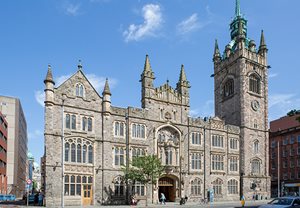 “As a result of the pandemic, along with other organisations, businesses and society as a whole, the Church has witnessed extraordinary times over the past 19 months that have required unprecedented adjustment in how we do Church and how we do our business. Because of this, our autumn meeting, as I said recently, will be an exceptional meeting that reflects the exceptional times we are living through.
“As a result of the pandemic, along with other organisations, businesses and society as a whole, the Church has witnessed extraordinary times over the past 19 months that have required unprecedented adjustment in how we do Church and how we do our business. Because of this, our autumn meeting, as I said recently, will be an exceptional meeting that reflects the exceptional times we are living through.
“The pandemic and its impact on society, the lives of individuals, families, church families and frontline workers at home, and Covid’s impact overseas, will be reflected in the business before us. It will also be recognised throughout the three days of our meeting as we discuss heartfelt resolutions that will pay tribute to, and thank, frontline workers, health and social care workers who have enabled essential services to be maintained across Ireland and the vulnerable to be cared for. That appreciation also extends in resolutions that pay tribute to everyone involved in schools.
Mr Gribben continued, “Covid meant that for the first time in our history, we had to cancel our General Assembly last year. In an era that will be remembered for many things, including Zoom meetings and meetings via Microsoft Teams, I am really very thankful that with the easing of some Covid regulations and the opening up of society, we can gather together in person once more for fellowship, worship, prayer, Bible study, debate and decision making.”
The Clerk explained that, “just as in every congregation throughout Ireland it is vitally important that when we meet together in this era of Covid, that we do so in a safe and secure way as possible. Therefore, the General Assembly, following government guidelines, will have various necessary mitigations in place. As a result we have not been able to invite civic guests, or representatives from our partner churches at home and overseas, although we will be hearing from some of our overseas partner churches via video on Wednesday.
“Neither have we been able to include those members of our church who would normally sit and deliberate, which is regrettable, but unavoidable. Only full voting members will be present in person who are, the main, our ministers in congregations, active and retired and a commissioned representative elder from each of our 500-plus congregations. While all sessions will be livestreamed, unfortunately there will be no public gallery this year, although the media will be facilitated.”
Another significant change is that the General Assembly will open on Monday morning, not Monday evening. The Moderator’s address will kick start the three days of debate and decision on upwards of 80 resolutions. There will be three worship services led by Dr Bruce, including the sacrament of the Lord’s Supper on Tuesday morning. This service will include the reading of the names on the Memorial Roll, honouring the memory and ministry of ministers who have passed away since the General Assembly last held an in person meeting in 2019.
Supporting congregations
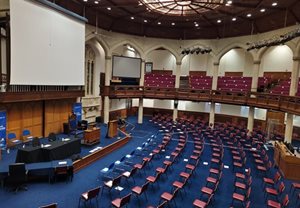 “There can be absolutely no doubt that the life and rhythm of our church, since the first lockdowns of March last year, have witnessed extraordinary change, not least in the Republic of Ireland where our congregations, along with others, experienced considerable periods when they were not able to meet for worship,” Mr Gribben said.
“There can be absolutely no doubt that the life and rhythm of our church, since the first lockdowns of March last year, have witnessed extraordinary change, not least in the Republic of Ireland where our congregations, along with others, experienced considerable periods when they were not able to meet for worship,” Mr Gribben said.
“The Blue Book, which contains the reports and resolutions to be debated, has an introduction to one report entitled ‘The Era of Covid-19’. In it, it says that ‘what we used to call ‘normal life’ has been changed in ways that none of us could have imagined…’ It describes how the lives of individuals, families and church families have been ‘turned upside down’, with the impact on church life having been ‘significant, [and] at times, almost overwhelming.’ It also details the overall approach, co-operation and general engagement with the administrations in both jurisdictions, which differed considerably.”
Throughout the period of the Covid-19 pandemic the Church has sought to support congregations and their members during this season of intense disruption. The Council for Congregational Life and Witness has been proactive in responding to the diverse challenges faced by congregations.
The General Assembly will hear the initiatives that have been undertaken, in particular, as the Council’s report states, ‘the development of a whole series of digital and distanced ways of supporting congregations including, Bible study for download and use in the digital space on pandemic specific themes, a regular series of webinars and podcasts on a range issues pertinent to congregations and their members and a series of ‘Fanning the flame’ sessions encouraging a gradual return to more regular patterns of church life delivered for all 19 presbyteries.’
“It is more than appropriate that the General Assembly will be asked to pay tribute to local ministers, elders and leaders, ‘for their dedicated and innovative service enabling congregational life and witness to continue in the ways that were possible during the long months of restrictions and shut-downs…’” Mr Gribben said.
The dedicated work of PCI’s chaplains serving in hospitals, prisons, the forces and universities and colleges during the pandemic, will also be recognised, ‘with sincere gratitude’ in another resolution. The General Assembly will also be asked to welcome the anticipated launch of the Rural Chaplaincy Pilot Scheme, with the announcement of PCI’s first Rural Chaplain. The General Assembly will also be asked to formally accept 14 students for the ordained ministry.
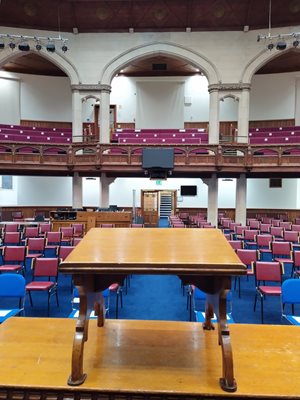 “The Church is very much a part of society, rooted in communities across Ireland and it is from the north, south, east and west of the country that my brothers and sisters in Christ will come to discuss a range of denominational matters, and pressing, social, moral and public issues of the day. One of these is Climate Change,” Mr Gribben said.
“The Church is very much a part of society, rooted in communities across Ireland and it is from the north, south, east and west of the country that my brothers and sisters in Christ will come to discuss a range of denominational matters, and pressing, social, moral and public issues of the day. One of these is Climate Change,” Mr Gribben said.
PCI’s investments and fossil fuels
In 2018 the General Assembly passed a resolution commending the Stewardship of Creation Report on Climate Change that had been produced by the Council for Global Mission. This year’s Global Mission report also features other work in this area. It includes the ongoing Climate Sundays’ initiative, which encourages congregations to set aside one Sunday in the run up to COP26, November’s global Climate Change conference in Glasgow, to focus on God’s creation and humanity’s responsibility to be good stewards of it.
The Stewardship of Creation Report provides a biblical and theological foundation to guide PCI as it approaches issues relating to the care of God’s creation. It affirms God’s creation as being good and reflects on the importance of God’s people being good stewards of that same creation.
“On Tuesday, the Assembly will debate a significant resolution from the Council on a ‘divest and engage’ strategy in relation to PCI’s investments. The debate will be preceded by discussion around the Report of the Trustees, which includes a paper on investments in fossil fuels, giving important background information,” Mr Gribben said.
The Council for Global Mission report states that, ‘…PCI’s investment policies must flow from a biblical basis and theology of creation, a commitment to God’s world and to those whom Jesus Christ described as neighbours. The broad consensus of scientific thought supports the view that fossil fuel production contributes to climate change. It is therefore morally questionable to invest in companies deriving revenue from fossil fuels. PCI’s response should reflect a consistency of witness and provide a lead to church members and wider society. Most importantly, how PCI invest reflects how we value our Heavenly Father’s creation and is an outworking of what it means to be disciples of Jesus Christ.’
The General Assembly will be asked to ‘…direct the Trustees to employ a ‘divest and engage’ strategy in relation to companies producing or using fossil fuels, thereby divesting from those that derive more that 10% of their turnover from oil and gas extraction (the coal, oil and gas majors), and engaging with companies that derive more than 10% of their turnover from the use of fossil fuels…’
Speaking into the public square
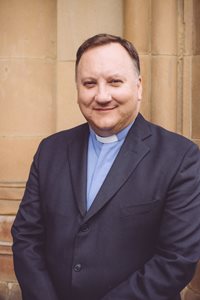 Despite the challenges presented by the global pandemic this particular element of the work of the Church – developing its thinking on current issues and communicating the General Assembly’s views in the public square through the Council for Public Affairs, has continued at apace.
Despite the challenges presented by the global pandemic this particular element of the work of the Church – developing its thinking on current issues and communicating the General Assembly’s views in the public square through the Council for Public Affairs, has continued at apace.
Since December 2020 the Church has made 13 submissions on significant public consultations on a wide range of issues in both jurisdictions. Following a conference held in 2019, to further develop its thinking and key areas of work, the Council introduced two new panels.
The remit of the new Human Dignity Panel, includes beginning and end of life, human rights, artificial intelligence, and matters relating to criminal justice. The new Welfare and Wellbeing Panel, has a remit which includes welfare support, housing and homelessness, debt, ageing and loneliness.
In speaking into the public square, the General Assembly will be asked to express its ‘…continued support for the devolved institutions in Northern Ireland…’ Further, Members will be asked to express their ‘…grave concern about the undermining of the devolution settlement by the Secretary of State for Northern Ireland through the imposition of legislation on matters within the competency of the Northern Ireland Assembly, including abortion and the cultural package.
The General Assembly will also be asked to share the concerns of the Council regarding matters of legacy and dealing with the past, as the UK government has indicated its intention to move away from arrangements for dealing with the past in the Stormont House Agreement. One key area, is the right of victims and survivors to seek due process and justice in the courts. The Council’s report states that, ‘What has been proposed by the Secretary of State for Northern Ireland denies victims and survivors that possibility.’
Listening to the Global Church
“While it is important to speak out, it is also important to listen and much of the work of the reports and resolutions to be discussed next week have been a result of gracious listening and discussion,” Mr Gribben said.
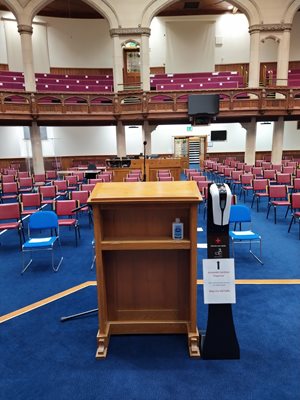 “An important feature of General Assemblies since 2015 has been the inclusion of the Council for Global Mission’s alternative presentation ‘Listening to the Global Church’. It has been an important opportunity to hear of the challenges and opportunities that our brothers and sisters in Christ around the world are encountering and to pray with them. This year it forms part of Wednesday afternoon worship service,” Mr Gribben said.
“An important feature of General Assemblies since 2015 has been the inclusion of the Council for Global Mission’s alternative presentation ‘Listening to the Global Church’. It has been an important opportunity to hear of the challenges and opportunities that our brothers and sisters in Christ around the world are encountering and to pray with them. This year it forms part of Wednesday afternoon worship service,” Mr Gribben said.
Entitled ‘Christ our hope’ the General Assembly will hear how different churches, and their home nations, have coped with a range of disasters / crises alongside the impact of a global pandemic. Unlike previous years, when leaders of PCI’s partner churches could be welcomed in person, this year, via recorded video messages and interviews, Members of Assembly will have the opportunity to listen to senior representatives from the Church of Central Africa Presbyterian in Zambia and the Evangelical Christian Church of Timor. A producer from PCI’s partner SAT7, the Christian satellite television network, which broadcasts in Arabic, Persian and Turkish across the Middle East and North Africa, including Afghanistan, will talk about the Christian community and other minorities in Afghanistan and also how the Christians in neighbouring Iran are praying for their neighbours at this very difficult time.
Decision making and dissent within PCI
Much of the work to be discussed at this year’s delayed General Assembly has its genesis in previous meetings. Following a number of decisions taken by the 2018 General Assembly, that led to much public (and private) comment, the General Council, PCI’s senior decision making body that takes any necessary decisions on behalf of the General Assembly between its meetings, accepted that clarification was necessary regarding the issues of decision making and dissent within the denomination. It established a Task Group to draw up a report on ‘Presbyterian decision making and the place of dissent’.
The Report of the General Council is the most substantial of all the Reports in the Blue Book. Made up of 4 separate reports, it runs to some 140 pages out of the Blue Book’s 344.
Mr Gribben explained that part of the Decision Making and Dissent Task Group’s remit was to outline how decisions are made in PCI’s Presbyterian system of church government, what dissent formally means and how other forms of ‘dissent’ can be expressed, while outlining how decisions of the General Assembly can be changed.
“The 2019 Assembly considered the initial report and agreed to send it down to PCI’s 19 regional presbyteries for discussion, with focused questions on decision making and dissent to be discussed by representatives of all PCI’s 500-plus congregations. With all presbyteries responding, it was favourably received and originally scheduled for further discussion in 2020. Like most business scheduled for that year, however, the report was remitted by the 2020 Standing Commission of the General Assembly, to the next Assembly,” Mr Gribben said.
.jpg.aspx?width=200&height=283) The comprehensive report, which will also be debated on Tuesday, makes 12 recommendations that would, if passed, alter significantly the way in which PCI manages and discusses policy prior to a General Assembly. This would include the introduction of regional / presbytery conferences and a ‘Green Consultation Paper Stage’, where significant changes in policy or controversial matters would be considered prior to coming to a General Assembly.
The comprehensive report, which will also be debated on Tuesday, makes 12 recommendations that would, if passed, alter significantly the way in which PCI manages and discusses policy prior to a General Assembly. This would include the introduction of regional / presbytery conferences and a ‘Green Consultation Paper Stage’, where significant changes in policy or controversial matters would be considered prior to coming to a General Assembly.
While the report says that ‘Those who are in the wider membership of the Church have greater freedom to hold/promote views at variance with the formal position of the Church…’ for ministers and elders ‘debate and discussion can of course also take place outside the formal structures of the Church, both in private discussions and in more organised ways.’ The report makes the point that they have ‘subscribed’ to the Subordinate Standards of the Church ‘…and, through ordination vows, have taken on the responsibility and constraints of leadership. This has implications in relation to the freedom of ministers and elders to hold/promote certain views at variance with the clear position of the General Assembly…’
The Task Group, therefore, proposes that the General Assembly instruct it to bring forward a paper to next year’s gathering on the ‘The Freedom of those in ordained Leadership to Promote Opinions at variance with the clear position of the General Assembly.’
On Wednesday, the General Assembly will also discuss a separate report on making the General Assembly more accessible, which includes the recommendation to meet on a Wednesday evening with three further days of business, including evening sessions, with the General Assembly closing on Saturday afternoon.
Credible profession of faith
While each of the three days are busy, with business scheduled for debate on Monday and Tuesday evening, Tuesday itself will also see the Assembly discuss one of the widest consulted on papers in recent times.
The Implementation Task Group was established in 2018 to address the remit given to it by that year’s General Assembly that, ‘appropriate training be offered to kirk sessions on the theology and practice of the Church’s understanding of a ‘credible profession of faith’ and the pastoral guidelines on homosexuality. The Task Group was appointed and directed to put together a resource with a clear pastoral tone to be used by kirk sessions. This remit was broadened by the General Council to include training on a general approach to ‘a credible profession of faith’ as well as lifestyle issues. Two groups were formed to look at the issues of ‘Credible Profession’ and ‘Guidance for pastoral care’.
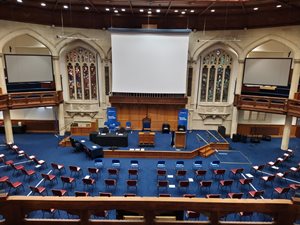 “The consultation to inform the work of this Task Group and its final reports, has been one of the widest consultation processes undertaken within the Church in recent years, with a comprehensive presbytery consultation taking place. Draft resources, ‘Credible Profession of Faith and admission to the sacraments: a framework for discussion for kirk sessions’ and ‘Guidelines for pastoral care of same-sex attracted people and their families’ were sent down to our 19 regional presbyteries for discussion and comment. It has been a long process, but an important one that has informed the two reports that the General Assembly will be asked to receive and approve,” Mr Gribben said.
“The consultation to inform the work of this Task Group and its final reports, has been one of the widest consultation processes undertaken within the Church in recent years, with a comprehensive presbytery consultation taking place. Draft resources, ‘Credible Profession of Faith and admission to the sacraments: a framework for discussion for kirk sessions’ and ‘Guidelines for pastoral care of same-sex attracted people and their families’ were sent down to our 19 regional presbyteries for discussion and comment. It has been a long process, but an important one that has informed the two reports that the General Assembly will be asked to receive and approve,” Mr Gribben said.
“As the framework states from the outset, ‘One of the joys of church life is accompanying individuals on a journey to exploring, experiencing and expressing faith in Christ as
Saviour and Lord.’ That journey can lead ultimately to an individual seeking membership of the Church or baptism. This report seeks to support kirk sessions in that journey focussing, as the report also states, on ‘…the role and responsibility for ministers and ruling elders to guide and shepherd the flock and to do so in a way that is loving…’
Mr Gribben continued, “During the consultation process, there was general approval for the Task Group’s approach, content and tone of the framework. Some common themes also emerged, relating to bringing young people and adults with special needs into membership of the Church. The General Assembly will be asked to establish a Task Group on this.”
The Guidance for pastoral care of same-sex attracted people and their families is also aimed at kirk sessions and those who provide pastoral care within congregations. As the guidance states ‘It is not meant to be exhaustive but to offer some practical help in this sensitive area.’
Human Identity
In the autumn of 2017, the General Council established the Human Identity Task Group as a means of seeking a Biblical and pastoral response to the complex and often difficult issues facing PCI members, families, ministers, congregations and wider society in respect of gender identity.
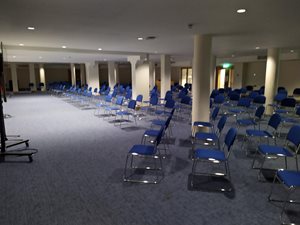 From the outset, the Task Group was conscious of the urgent need to resource PCI in order to, as the report states, ‘…help it navigate this publicly contested, highly nuanced and rapidly developing debate around gender identity. These issues are important but in congregational life what matters most is that those who struggle, and those close to them, receive good pastoral care that is full of God’s love and truth.’
From the outset, the Task Group was conscious of the urgent need to resource PCI in order to, as the report states, ‘…help it navigate this publicly contested, highly nuanced and rapidly developing debate around gender identity. These issues are important but in congregational life what matters most is that those who struggle, and those close to them, receive good pastoral care that is full of God’s love and truth.’
The resource, ‘A Biblical Framework and Guidance for Pastoral Care of People who Struggle with Gender Identity’ is intended to help equip those who provide pastoral care rather than to be given to those in need of pastoral care. With Presbyteries having been consulted on the framework, it will be, however, the first time that gender identity has been discussed on the floor of the General Assembly.
The Gospel of the Lord Jesus Christ
Mr Gribben concluded by saying, “While we will be meeting for only three days, there will be much business before us. At the heart of the Church is our central calling to proclaim and live out the Gospel of the Lord Jesus Christ in a constantly changing world. Much of our work next week seeks to further that primary calling in different contexts, including both within the Church and in relation to the public issues around us. After the last 19 months, it will also be a welcome opportunity to be together, and be able to worship together, as a Presbyterian family.”
The General Assembly will take place in Belfast from 11am Monday, 4 October to Wednesday, 6 October. Business will also take place on Monday and Tuesday evenings. For full details visit the General Assembly Overview page here. As in previous years, throughout the General Assembly there will be a live Twitter feed. You can follow preceedings via @pciassembly hashtag #PCIGA21.
In a special podcast, 'Lets talk about the General Assembly' hosted by Neil Harrison, PCI's Mission Development Officer, the Moderator, Clerk and the Secretary to the Council for Global Mission, Rev Uel Marrs, discuss the practicalities of what to expect next week and some of the themes being discussed this year.
Photos: (1) Assembly Buildings in Belfast (2) the socially distanced Assembly Hall (3) view from the Moderator's chair (4) Rev Trevor Gribben, Clerk of the General Assembly (5) view from the speaker's lecturn (6) the Moderator Rt Rev Dr David Bruce (7) overflow space in the conference room.